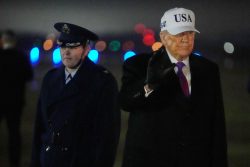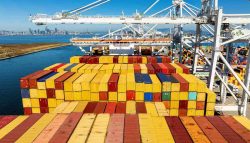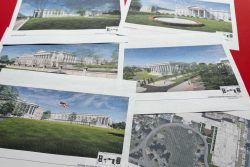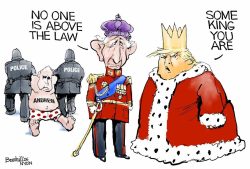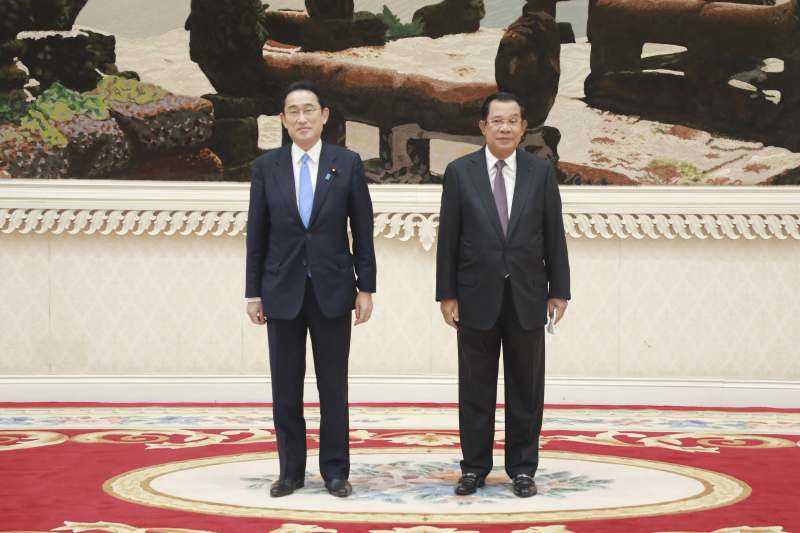
Cambodian Prime Minister Hun Sen, right, poses for photographs together with his Japanese counterpart Fumio Kishida at Peace Palace in Phnom Penh on Sunday.
9:05 JST, March 21, 2022
PHNOM PENH (AP) — Japanese Prime Minister Fumio Kishida visited Cambodia for talks with the country’s longtime leader, Hun Sen, on Sunday to deepen relations and promote calls for the rule of law in one of the Southeast Asia’s closest partners of both China and Japan.
Kishida and Hun Sen in a joint statement condemned Russia’s aggression in Ukraine and called for “an immediate stop of the use of force and the withdrawal of the military forces from the territory of Ukraine.” They stressed “neither threat nor use of all kind of weapons of mass destruction can ever be accepted in any occasion.”
After China, Japan is Cambodia’s largest donor and has funded the construction of bridges, roads, ports, electricity and water supply.
But Japan and the U.S. also share concerns over China’s growing military assertiveness in the region. In Cambodia, Washington has been recently focused on China’s construction of new facilities at Ream Naval Base and the potential for its military to have future basing rights there.
Ream faces the Gulf of Thailand that lies adjacent to the South China Sea, where China has been engulfed in territorial disputes with its smaller Southeast Asian neighbors. Cambodia generally supports Beijing’s geopolitical positions, and in return, Beijing’s backing for Hun Sen allows Cambodia to disregard Western concerns about its poor record in human and political rights.
The joint statement, however, included language that appears to indirectly criticize some of China’s actions in the South China Sea, an unusual position for Cambodia.
It said that Kishida and Hun Sen reaffirmed the importance of sustaining peace, security, safety, freedom of navigation in and overflight above the South China Sea, as well as non-militarization and peaceful resolution of disputes in accordance with international law, including the 1982 U.N. Convention on the Law of the Sea.
Beijing claims the South China Sea virtually in totally and has chafed at Washington’s insistence on freedom of navigation. China has also militarized several island outposts and rejects an international tribunal’s ruling that its territorial claims are excessive.
The two leaders “reaffirmed to continue to cooperate towards realizing a ‘Free and Open Indo-Pacific’” — a vision Japan has been pushing with the United States to counter China’s growing influence.
Speaking to Japanese reporters, Kishida said that it was meaningful that he was able to share determination with both Indian and Cambodian leaders during his trips to both countries this weekend not to allow any attempts to change the status quo by force “in any region” even though Russia was not directly criticized in their joint statements.
“Realistically, it is impossible to expect all countries to agree on everything. It was a major achievement that we confirmed our basic stance that we do not tolerate any unilateral attempt to change the status quo by force,” he said.
In the joint statement, Kishida also expressed his intention to support “the promotion of democracy and the rule of law such as holding elections in a way that reflects diverse voices from Cambodian people.”
Just last week, a court in Cambodia convicted 21 people of treason and related charges for their nonviolent opposition activities. They included seven exiled leaders of the disbanded Cambodia National Rescue Party — the main opposition party— each of whom received 10-year prison terms.
Kishida’s visit came three days after the departure of two Japanese naval ships from Ream Naval Base, where the Japan Maritime Self-Defense Force conducted demining training with Cambodian counterparts.
Japan has poured several million dollars for mine clearing operations in Cambodia in the aftermath of the 1975-1979 genocide that left an estimated 1.7 million people dead and the subsequent civil war. Japan also provided money to the U.N.-backed Khmer Rouge tribunal. In recent months, Japan has donated 1.3 millions doses of coronavirus vaccines to Cambodia.
The talks also covered the situation in military-ruled Myanmar, where the prime ministers called for the immediate cessation of violence and a stop to the flow of weapons following the army’s ouster of the civilian administration of Aung San Suu Kyi in February last year.
They called on “all parties to exercise utmost restraint and commencement of a process of dialogue for peaceful solution, and the release of political detainees, as well as return to normalcy and the democratic political system.”
Cambodia is the current chair of the Association of Southeast Asian Nations and Hun Sen is leading the group’s efforts to ease the Myanmar crisis, which some U.N. experts have characterized as civil war.
Top Articles in News Services
-

Survey Shows False Election Info Perceived as True
-

Prudential Life Expected to Face Inspection over Fraud
-

Hong Kong Ex-Publisher Jimmy Lai’s Sentence Raises International Outcry as China Defends It
-

Japan’s Nikkei Stock Average Touches 58,000 as Yen, Jgbs Rally on Election Fallout (UPDATE 1)
-

Trump Names Former Federal Reserve Governor Warsh as the Next Fed Chair, Replacing Powell
JN ACCESS RANKING
-

Japan PM Takaichi’s Cabinet Resigns en Masse
-

Japan Institute to Use Domestic Commercial Optical Lattice Clock to Set Japan Standard Time
-

Israeli Ambassador to Japan Speaks about Japan’s Role in the Reconstruction of Gaza
-

Man Infected with Measles Reportedly Dined at Restaurant in Tokyo Station
-

Man Infected with Measles May Have Come in Contact with Many People in Tokyo, Went to Store, Restaurant Around When Symptoms Emerged


